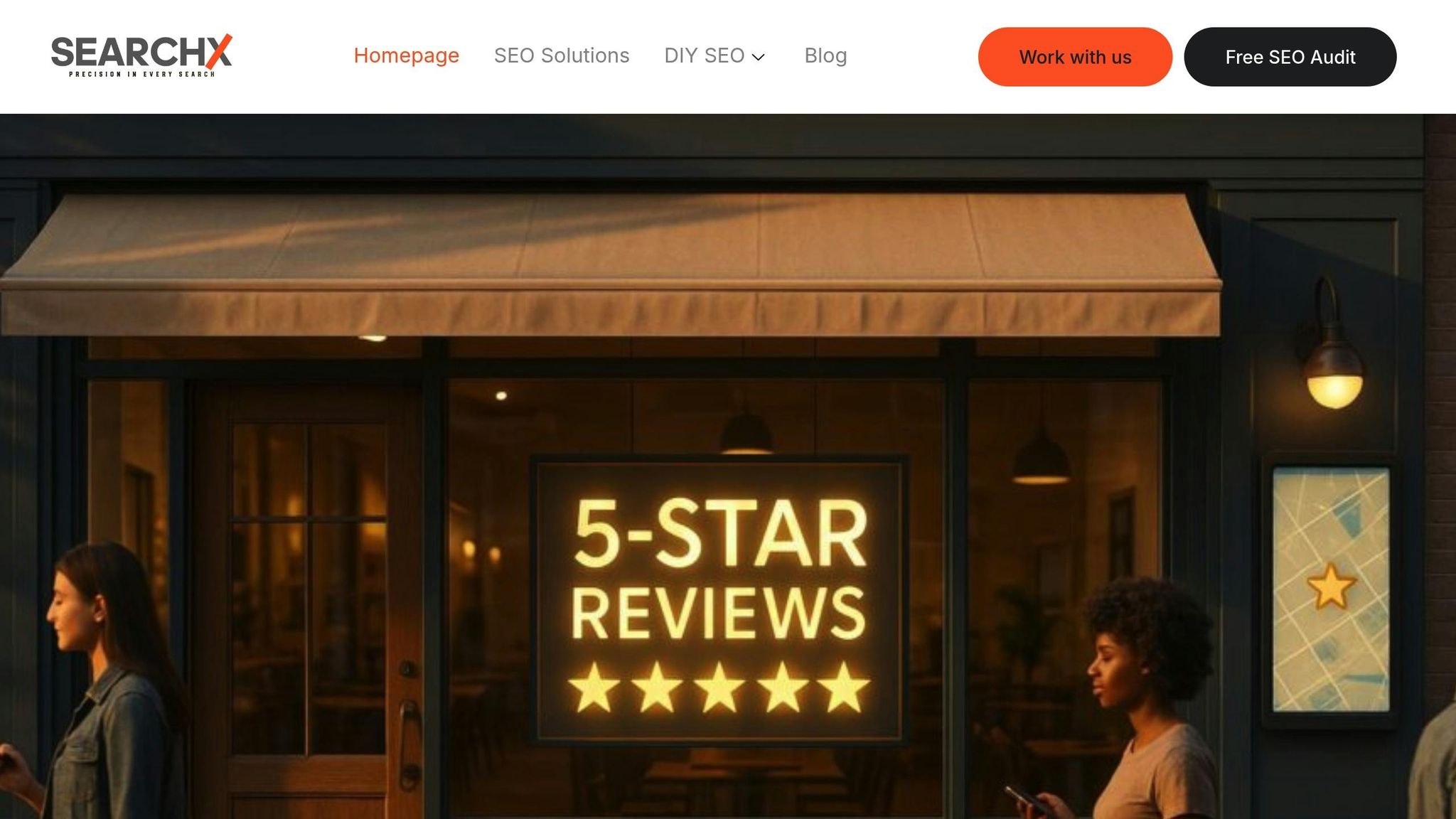Want to rank higher in NYC local search results? It starts with citations – mentions of your business’s Name, Address, and Phone Number (NAP) across online platforms. Here’s why they matter and how to get them right:
- Citations boost local rankings: Search engines use them to verify your business’s location and trustworthiness.
- Consistency is key: Even small differences in NAP details across platforms can hurt rankings.
- Top directories matter most: Focus on platforms like Google Business Profile, Yelp, and NYC.gov.
- Regular audits prevent errors: Monthly checks ensure your info stays accurate and up-to-date.
NYC businesses face fierce competition. A solid citation strategy, optimized listings, and regular monitoring can make all the difference.
What Are Local Citations? How to Build Local Business Directory Listings
Top NYC Online Directories for Local SEO
Getting your business listed in trusted online directories is a smart way to improve your local search visibility. In New York City, there are several key platforms, including hyperlocal and official city resources, that can help you connect with your audience.
Main General NYC Directories
Patch.com is a hyperlocal platform that covers over 30,000 communities across the U.S., including NYC neighborhoods. It’s a great tool for businesses to promote themselves, share events, and advertise local goods and services to their community audience.
NYC.gov, the official website of the New York City Government, is another essential resource. It not only provides city information and services but also boosts your business’s credibility and presence online.
While these are the big names, there are plenty of other directories out there that cater to specific industries or niches, giving you even more opportunities to expand your reach.
Industry-Specific Directories for NYC Businesses
If your business operates in a particular sector, look for directories that are tailored to your industry. These platforms often attract a more targeted audience, which can translate into higher-quality leads.
How to Find Directories for Your Business
To discover directories that fit your business, try using search terms that include your NYC neighborhood and industry. This approach can help you uncover localized platforms that are perfect for connecting with your target market.
Citation Accuracy and Consistency Best Practices
Getting your business information right is key to earning trust from search engines and improving local rankings. When your name, address, and phone number (NAP) are consistent across all platforms, search engines view your business as more reliable and credible.
How to Audit and Update Your Citations
Start by creating a master document that includes your exact business name, address, phone number, website URL, and business hours. This document will serve as your go-to reference for all citations.
Next, search for your business name along with your city or neighborhood to locate existing citations. Begin with major platforms like Google My Business, Yelp, and industry-specific directories, then check local NYC resources. Make a note of any inconsistencies you find.
When you spot incorrect citations, prioritize fixing them on high-traffic platforms first. Directories like Google My Business, Yelp, and NYC.gov carry more authority, so correcting errors there should be your top priority. If you can’t edit a listing yourself, reach out to the directory owner. Most legitimate directories are willing to help businesses correct inaccuracies.
Duplicate listings can also cause problems. Claim these duplicates and request either a merge or deletion. Multiple listings for the same business can confuse search engines and hurt your rankings.
Consistency is critical. Even small differences in your information across platforms can undermine your local SEO efforts.
How Small Errors Hurt Your Rankings
Even minor mistakes can have a big impact. Search engines rely on consistency signals to verify that your business is legitimate. If they detect conflicting information across platforms, they may struggle to determine which details are correct, which can hurt your local search rankings.
For instance, slight variations in abbreviations or formatting can create confusion. In NYC, inconsistent business hours are particularly problematic. Imagine a customer checks Google My Business and sees you close at 8:00 PM, but Yelp says 9:00 PM. If they arrive after 8:00 PM to find your business closed, it could lead to frustration, negative reviews, and a loss of trust – both from customers and search engines.
Address formatting is another critical factor, especially in NYC, where the street numbering and borough system can be complex. Always use the same format, including apartment or suite numbers and ZIP codes. For example, "123 Main St, New York, NY 10001" should match across every listing, avoiding variations like "123 Main Street, Manhattan, NY 10001."
Ongoing Citation Monitoring and Maintenance
To keep everything in check, conduct monthly citation audits. This helps you catch errors before they affect your rankings. Additionally, search for your business name quarterly to identify new citations that may have been created without your knowledge. Some directories generate listings automatically from public records, and these often contain mistakes.
Monitor your most important citations weekly, especially on platforms like Google My Business and Yelp, along with key industry directories. System updates or user edits can sometimes alter your information without your knowledge, so regular checks ensure everything stays accurate.
Set up Google Alerts or similar tools to track mentions of your business name online. This way, you can quickly spot and claim new listings as they appear. Once claimed, make sure the information matches your master document to avoid discrepancies.
Finally, maintain detailed records of all your citations, including login credentials for platforms where you can make edits. Update this master list whenever you change key business details, such as your phone number, address, or business hours. A systematic approach like this helps prevent inconsistencies and keeps your local SEO strong in NYC’s highly competitive landscape.
How to Optimize Citations for NYC Local SEO
Once you’ve ensured your citations are accurate, the next step is to optimize your business listings. In a competitive market like NYC, standing out requires more than just listing basic information – it’s about creating profiles that engage potential customers and improve your visibility. Here’s how you can take your listings to the next level.
Adding More Information to Business Listings
Detailed and engaging listings perform far better than bare-bones profiles. Most online directories let you include descriptions, photos, business hours, and additional contact details – use every opportunity to make your profile shine.
Start by writing a descriptive, keyword-rich summary of your business. Highlight what makes your NYC business special. For example, instead of saying, "We sell pizza", try: "We’re a family-owned pizzeria in Brooklyn serving authentic Neapolitan pizza since 1995." This approach not only appeals to search engines but also resonates with potential customers.
Photos can make a big difference, too. Upload high-quality images that showcase your business. For restaurants, this could mean appetizing shots of your dishes. Retail stores might highlight their best products or a welcoming store layout. Service businesses can include photos of their team or work in action to build trust and relatability.
Business hours are another crucial detail, especially in a city like NYC where schedules can vary widely. Be specific about your operating hours, including any differences for weekends, holidays, or seasonal changes. If you offer 24/7 services, make that clear across all platforms. Precise and up-to-date hours help customers know when they can rely on you.
Don’t forget to include links to your website, social media profiles, and additional contact information. These details not only enhance trust but also make it easier for customers to connect with you.
Choosing the Right Business Categories
Accurate categorization is a game-changer for local search visibility. Directories use your selected categories to decide whether your business matches a specific search, like "Italian restaurant in Brooklyn" or "plumber in Manhattan".
Choose a primary category that best describes your business. Be as specific as possible – if you’re an Italian restaurant, select "Italian Restaurant" instead of just "Restaurant." Many directories also allow you to select multiple categories. This is particularly useful for businesses offering diverse services. For instance, a company providing plumbing and heating services should select both "Plumber" and "HVAC Contractor."
NYC businesses can also use location-specific attributes to stand out. Platforms like Google Business Profile allow you to highlight features such as being "Women-owned" or "LGBTQ+ friendly." These attributes not only attract like-minded customers but can also help your business appear in niche searches.
For competitive markets, industry-specific categories are essential. A general term like "Contractor" won’t be as effective as something more precise, such as "Kitchen Remodeling Contractor" or "Bathroom Renovation Specialist". Regularly review and update your categories as your business grows or adds new services to ensure you’re capturing relevant searches.
Getting and Managing Customer Reviews
Customer reviews are a powerful tool for boosting both your search rankings and your credibility. They can significantly influence a potential customer’s decision to choose your business.
To generate reviews, simply ask satisfied customers. Train your team to recognize happy clients and encourage them to leave feedback while the experience is still fresh. Timing is everything – whether it’s after a great meal, a successful service, or a memorable interaction, that’s the moment to ask.
Make it easy for customers to leave reviews by providing direct links to your Google Business Profile, Yelp, or other platforms. You can also create QR codes that link directly to review pages or include review links in follow-up emails, receipts, or business cards.
Responding to reviews is just as important as getting them. For positive feedback, show genuine appreciation: "Thanks for dining with us, Maria! We’re so glad you loved the pasta special." For negative reviews, stay professional and offer a resolution: "We’re sorry to hear about your experience. Please contact us directly so we can make it right." This shows potential customers that you care about their input.
Steer clear of fake reviews – they can damage your reputation. Focus on organic feedback from real customers to maintain authenticity.
Regularly monitor your review profiles and aim to respond to new reviews within 24–48 hours. Quick responses not only demonstrate that you value customer feedback but also show that you’re actively managing your business’s reputation.
For businesses with a high volume of interactions, consider using a review management system. Automated follow-ups, staff incentives for generating reviews, or assigning team members to handle feedback can streamline the process.
Finally, analyze your reviews over time. Look for recurring themes – if multiple customers mention the same issue, address it operationally rather than just responding to individual reviews. On the flip side, use positive feedback to highlight your strengths in marketing materials and business descriptions. This not only improves your reputation but also helps attract more customers.
Citation Management Tools and Services for NYC
Keeping your business information consistent across directories is essential for local SEO success. However, juggling citations across multiple platforms can be overwhelming, especially for busy NYC business owners. Thankfully, there are tools and services that simplify this process, ensuring your business details remain accurate and up-to-date. Below, we’ll explore some of the best tools for citation management and how services like SearchX can give your local SEO efforts a boost.
Top Tools for Citation Management
Google Business Profile is a must-have for any NYC business. It’s free, directly impacts your visibility on Google Search and Maps, and comes with detailed analytics to track your performance. Think of it as the backbone of your citation strategy.
Yelp for Business is another key platform, especially given its popularity among NYC consumers. It allows you to claim your listing, manage customer reviews, and access analytics to monitor engagement – essential for building a strong online reputation.
Apple Maps Connect is crucial for ensuring your business appears accurately on Apple Maps, which is increasingly important due to the high number of iPhone users. Keeping your details current here ensures customers can easily find you on Apple devices.
For businesses with multiple locations, tools like BirdEye and Podium offer enterprise-level solutions. These platforms centralize management across hundreds of directories and streamline customer communication, saving time and effort.
Whitespark specializes in citation tracking and building. Their Local Citation Finder helps identify the most relevant directories for your industry and location, while their citation audit service pinpoints where your business information already exists online.
While these tools provide a strong foundation, services like SearchX take citation management to the next level with tailored local SEO solutions.
SearchX Solutions for Local SEO

SearchX offers a range of local SEO solutions specifically designed for competitive markets like NYC. Their DIY local SEO tools enable business owners to manage citations effectively while offering professional support when needed.
One standout feature is their Free GMB Audit Tool, which provides an instant evaluation of your Google Business Profile. It highlights missing details, optimization opportunities, and areas where you can improve to compete more effectively with local businesses.
SearchX also offers tiered plans to suit different needs:
- The Starter Plan covers local listings across 50+ directories.
- The Growth Plan adds competitor analysis and expanded directory coverage.
- The Enterprise Plan includes comprehensive citation management, dedicated account support, and ongoing monitoring.
Additionally, SearchX provides technical SEO services to ensure your website supports your local SEO efforts seamlessly.
Manual vs. Professional Citation Management
When deciding between managing citations yourself or hiring professional services, it’s important to weigh the pros and cons:
| Factor | Manual Management | Professional Services |
|---|---|---|
| Cost | $0-$500/month | $1,000-$5,000+/month |
| Time Investment | 10-20 hours/month | 1-2 hours/month oversight |
| Learning Curve | High | Low |
| Scalability | Limited by your time | Easily scales with business growth |
| Directory Coverage | 10-30 directories typically | 50-200+ directories |
| Monitoring Frequency | Monthly or quarterly | Weekly or real-time |
| Error Detection | Manual checking required | Automated alerts and monitoring |
| Competitor Analysis | Time-intensive research | Included in most packages |
Manual management is a good starting point for single-location businesses with smaller budgets. It requires time and effort to research directories, create accounts, and monitor for errors, but it’s a great way to learn the basics of digital marketing.
On the other hand, professional services are ideal for multi-location businesses or those in competitive industries. While the upfront cost is higher, the time savings and improved search rankings often justify the investment. These services handle everything from directory submissions to ongoing monitoring, allowing you to focus on running your business.
Many NYC businesses begin with manual management to understand the process, then transition to professional services as they grow. For example, a neighborhood coffee shop might handle citations manually, while a multi-location law firm would benefit from a professional approach. The key is aligning your strategy with your business goals and resources.
Building Your NYC Citation Strategy
Once you’ve grasped the importance of accurate citations, the next step is crafting a solid strategy. In NYC’s competitive business environment, even small errors in your citations can hurt your search rankings and make it harder to attract customers. A well-planned approach ensures your business stands out for the right reasons.
Start with the basics: Make sure your NAP (Name, Address, Phone number) details are consistent everywhere. Search engines prioritize businesses with uniform information across platforms. Even minor discrepancies can confuse both search engines and potential customers.
Prioritize high-traffic directories like Google Business Profile, Yelp, and Apple Maps Connect. These platforms are essential for NYC businesses, driving the majority of local traffic. Once you’ve optimized these, move on to directories tailored to your specific industry.
Stay proactive with regular monitoring. Conduct monthly audits for your most critical listings and quarterly reviews for all directories. This helps catch and correct errors before they impact your rankings or mislead potential customers. Keeping your information up-to-date ensures both search engines and customers have accurate details.
Use technology to streamline your efforts. Depending on the size of your business, you can choose between manual management or professional services. For example, SearchX offers DIY local SEO tools that provide professional-grade features while letting you manage citations at your own pace and budget.
Tailor your approach to your business size. If you run a single-location business, manual management might be enough. For multi-location operations, automated tools or professional services can save time and ensure accuracy across all locations. The key is to match your strategy to your current needs while keeping an eye on future growth.
As your business expands, your citation strategy should evolve too. In NYC’s fast-paced market, businesses that actively manage and optimize their citations consistently outperform those that neglect this critical aspect.
FAQs
How can I keep my business’s Name, Address, and Phone (NAP) details consistent across platforms to improve local SEO in NYC?
Ensuring your business’s Name, Address, and Phone number (NAP) details are consistent across all platforms is a key step to boosting local SEO in NYC. Even minor differences, like abbreviations or format variations, can negatively impact your search rankings.
To keep things accurate, always use the exact same version of your business name, address, and phone number on every listing. Regularly audit your profiles to catch outdated or incorrect details and update them as needed. Claiming and verifying your business profiles on platforms like Google Business Profile and Yelp gives you full control over how your information appears.
When your NAP details are consistent, search engines are more likely to trust your business, which means potential customers can find you online more easily.
How can I optimize my NYC business listings to boost local search rankings?
To boost your local search rankings in NYC, make sure your business name, address, and phone number (NAP) are accurate and consistent across all online directories. Prioritize platforms like Google Business Profile, Yelp, and any directories specific to your industry.
Take the time to fully complete each listing. Add a detailed description of your business, choose the most relevant categories, include your website link, and upload high-quality images. It’s also important to regularly review and update your listings to fix outdated details and ensure everything stays accurate. In a competitive market like New York City, consistency and attention to detail can make all the difference.
What’s the best way to manage and monitor my business citations to improve local SEO in NYC?
To stay on top of your business citations, make sure your Name, Address, and Phone number (NAP) are accurate and consistent across all platforms. This includes directories, review sites, social media pages, and your own website. Any inconsistencies can negatively impact your local search rankings and might even confuse potential customers.
It’s a good idea to regularly audit your citations to catch and correct outdated or incorrect details. Focus on keeping your information accurate on key platforms like Google Business Profile and Yelp, as well as directories that are specific to your industry. Using tools or software can make it easier to track and update your listings across multiple platforms. By maintaining up-to-date citations, you not only gain trust but also improve your local visibility – an essential strategy in a competitive market like New York City.




